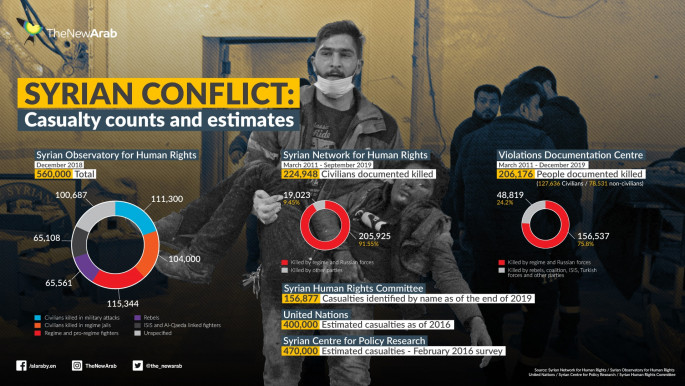Regime's Idlib offensive sparks largest civilian displacement in Syria's war: UN
"In just 10 weeks, since 1 December, some 690,000 people have been displaced from their homes in Idlib and surrounding areas," a spokesman for the Office for the Coordination of Humanitarian Affairs said.
"This is, from our initial analysis, the largest number of people displaced in a single period since the Syrian crisis began almost nine years ago," David Swanson said.
The UN expressed concern for civilians as Idlib is hit by freezing temperates amid shortages of tents, food, and clean water.
Snowfall in some regions and sub-zero temperatures are raising fears of a major humanitarian catastrophe and prompting the United Nations to make an urgent appeal for shelter solutions.
|
||
Read also: 'Humanity is dying': Syrians feel abandoned by the world
"Existing camps and settlements of internally displaced persons are overcrowded, and shelter in existing houses is getting scarce," the UN refugee agency said Tuesday.
"Many schools and mosques are filled with displaced families, and even finding a place in an unfinished building has become close to impossible," it said.
Meanwhile, the regime of Bashar al-Assad launched airstrikes strikes on Idlib City that have killed at least 12 civilians on Tuesday, a war monitor said.
Half of those killed in the strikes were minors, the Britain-based Syrian Observatory for Human Rights said.
Regime forces are also bombing Turkish military points around the Qaminas village in Idlib, causing casualties.
The airstrikes come shortly after two pilots were killed in the downing of a regime helicopter earlier on Tuesday.
According to UN figures, the Syrian conflict has caused the greatest displacement crisis in the world, with at least 5.5 million people fleeing the country and more than 6 million more displaced inside Syria.
The Syrian war is considered to have caused the biggest wave of displacement since World War II.
Agencies contributed to this report.
Follow us on Facebook, Twitter and Instagram to stay connected






 Follow the Middle East's top stories in English at The New Arab on Google News
Follow the Middle East's top stories in English at The New Arab on Google News
![Israeli forces ordered bombed Gaza's Jabalia, ordering residents to leave [Getty]](/sites/default/files/styles/image_330x185/public/2176418030.jpeg?h=a5f2f23a&itok=_YGZaP1z)

